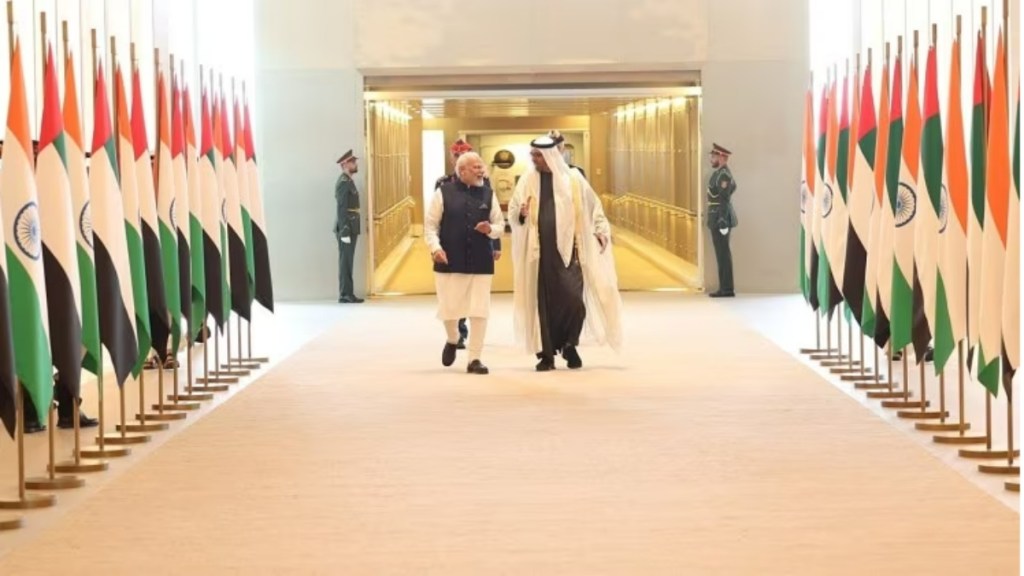Prime Minister Narendra Modi’s arrival in the UAE marks a pivotal moment in bilateral relations, as he embarks on a two-day visit aimed at fostering deeper ties and inaugurating the historic first Hindu stone temple in the nation.
The visit commenced with a ceremonial welcome at the Presidential Palace, setting the tone for high-level discussions between Prime Minister Modi and Sheikh Mohamed bin Zayed Al Nahyan, President of the UAE. These discussions covered a wide range of topics, including strategic partnerships, regional security, and economic collaboration. The signing of key agreements, such as the Bilateral Investment Promotion and Protection Agreement (BIPPA) and the memorandum of understanding (MoU) on electrical interconnection and trade, underscores the commitment of both nations to further enhance economic cooperation and trade facilitation.
Bilateral Investment Treaty:
A fresh Bilateral Investment Promotion and Protection Agreement (BIPPA) was inked. The two sides had inked an agreement in 2013 which came into effect in 2014. This agreement will lapse in September 2024.
This agreement will be a key enabler for further promoting investments in both countries. India has signed both a Bilateral Investment Treaty and a Comprehensive Economic Partnership Agreement with UAE.
MoU on cooperation in the field of electrical interconnection and trade:
This opens new areas of collaboration in the field of energy, including energy security and energy trade.
An Intergovernmental Framework Agreement between India and UAE on the India-Middle East Economic Corridor:
This would build on previous understandings and cooperation on this matter and foster India and the UAE cooperation furthering regional connectivity.
MoU on cooperation in Digital Infrastructure Projects:
Since the digital cooperation between the two economies is an important element of the partnership, this MoU will create a framework for a wide-ranging cooperation, including investment cooperation, in the digital infrastructure sector and also facilitate sharing of technical knowledge, skills and expertise.
Cooperation protocol between the National Archives of the two countries:
This protocol will shape extensive bilateral cooperation in this field including restoration and preservation of archival material.
MoU for cooperation in the field of heritage and museums:
This would foster engagement between the two countries aimed at supporting the Maritime Heritage Complex at Lothal, Gujarat.
Agreement on interlinking of the instant payment platforms – UPI (India) and AANI (UAE):
This will facilitate seamless cross-border transactions between the two countries. This follows the MoU on interlinking payment and messaging systems signed in July last year during Hon’ble PM’s visit to Abu Dhabi.
Agreement on inter-linking domestic debit/credit cards – RuPay (India) with JAYWAN (UAE):
An important step in building financial sector cooperation, this will enhance the universal acceptance of RuPay across the UAE. During the talks, PM Modi congratulated President Sheikh Mohamed bin Zayed Al Nahyan on the launch of UAE’s domestic card JAYWAN. This is based on the digital RuPay credit and debit card stack. They both witnessed a transaction made using the JAYWAN card.
Energy Partnership:
The two talked about strengthening energy partnership. And also appreciated that in addition to the UAE being among the largest sources of crude and LPG, India is now entering into long term contracts for LNG.
According to an official statement issued by the Ministry of External Affairs, RITES Limited signed an agreement with Abu Dhabi Ports Company and Gujarat Maritime Board with Abu Dhabi Ports Company. These would help in building port infrastructure and further enhance connectivity between the two countries.
Both sides noted that the BAPS Temple is a celebration of UAE-India friendship, deep-rooted cultural bonds and an embodiment of the UAE’s global commitment to harmony, tolerance and peaceful coexistence.

